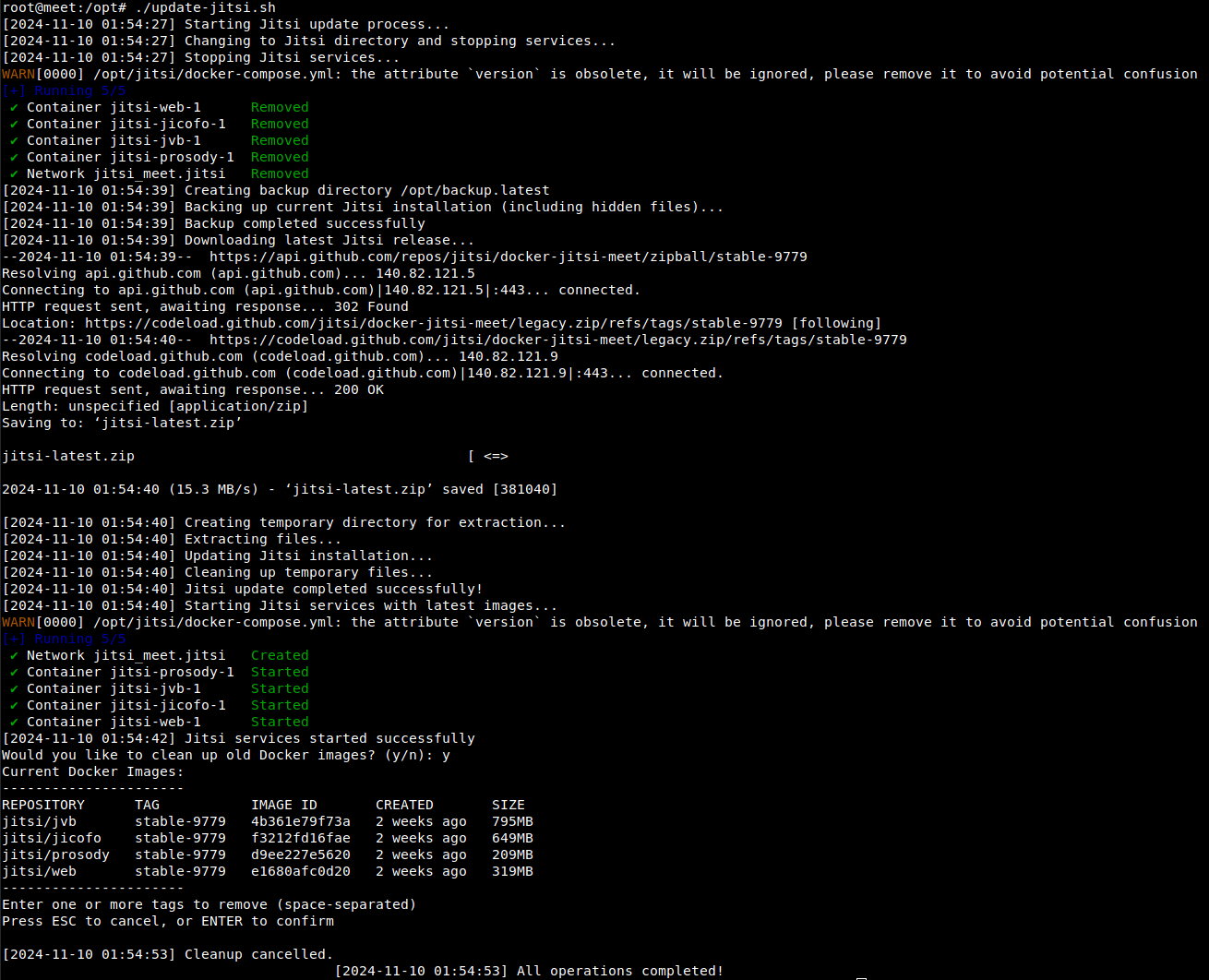
Categories
Money money money...
Could we help you? Please click the banners. We are young and desperately need the money



Last updated: January 13th 2025
Categories: Docker, Jitsi, Linux
Author: Marcus Fleuti
[solved] Automated Jitsi Meet Docker Update Bash Script. Work smarter, not harder



Introduction
Maintaining a Jitsi Meet installation can be challenging, especially when dealing with Docker containers and regular updates. In this comprehensive guide, we'll explore a powerful bash script that automates the entire Jitsi Meet update process, including backup creation, service management, and Docker image cleanup.
Why Automate Jitsi Meet Updates?
Jitsi Meet is a popular open-source video conferencing solution that many organizations rely on for their communication needs. When deployed using Docker, it requires regular updates to maintain security, stability, and access to new features. Manual updates can be time-consuming and error-prone, making automation essential for system administrators.
Key Features of the Update Script
- Automated backup creation before updates
- Graceful service shutdown and startup
- Latest release download from GitHub
- Interactive Docker image cleanup
- Comprehensive error handling and logging
- User-friendly progress updates
Script Components and Functionality
1. Utility Functions
The script begins with several utility functions that handle logging and error checking:
log_message() {
echo "[$(date '+%Y-%m-%d %H:%M:%S')] $1"
}
check_error() {
if [ $? -ne 0 ]; then
log_message "ERROR: $1"
exit 1
fi
}These functions ensure proper logging with timestamps and immediate error detection, making troubleshooting much easier.
2. Docker Image Management
One of the script's standout features is its sophisticated Docker image management system:
list_images() {
echo "Current Docker Images:"
echo "----------------------"
docker image ls
echo "----------------------"
}The script includes interactive cleanup functionality that allows administrators to remove old images easily. Please be aware that the script DOES NOT create any backups of the repository images before deleting them. It asks the user for delete confirmation though:
| Feature | This Script | Manual Updates | Basic Scripts |
|---|---|---|---|
| Automated Backup | Yes | No | Limited |
| Interactive Cleanup | Yes | No | No |
| Error Handling | Comprehensive | Manual | Basic |
3. Update Process
The main update process follows these steps:
- Service shutdown using Docker Compose
- Complete system backup
- Latest release download and extraction
- File updates and cleanup
- Service restart with new images
Prerequisites
Before using the script, ensure your system meets these requirements:
- Docker and Docker Compose installed
- Existing Jitsi Meet installation in /opt/jitsi
- The script is currently hardcoded to /opt/jitsi.
- wget and unzip utilities
- Sufficient disk space for backups
- Root or sudo access
Implementation Guide
1. Script Installation
Script code
#!/bin/bash
# Function for timestamped echo
log_message() {
echo "[$(date '+%Y-%m-%d %H:%M:%S')] $1"
}
# Function to check if a command was successful
check_error() {
if [ $? -ne 0 ]; then
log_message "ERROR: $1"
exit 1
fi
}
# Function to handle cleanup on script exit
cleanup() {
if [ ! -z "$SAVED_STTY" ]; then
stty "$SAVED_STTY" 2>/dev/null || true
fi
tput cnorm # Show cursor
}
# Function to list all docker images
list_images() {
echo "Current Docker Images:"
echo "----------------------"
docker image ls
echo "----------------------"
}
# Function to remove images by tag
remove_images() {
local tags=("$@")
if [ ${#tags[@]} -eq 0 ]; then
log_message "No tags specified. Skipping cleanup..."
return
fi
echo "The following images will be removed:"
echo "------------------------------------"
for tag in "${tags[@]}"; do
docker image ls | grep "$tag" || true
done
echo "------------------------------------"
read -p "Are you sure you want to proceed? (y/n): " -n 1 -r
echo
if [[ $REPLY =~ ^[Yy]$ ]]; then
for tag in "${tags[@]}"; do
log_message "Processing images with tag: $tag"
# Get all image IDs matching the tag
image_ids=$(docker images | grep "$tag" | awk '{print $3}')
for id in $image_ids; do
log_message "Stopping containers using image: $id"
# Find and stop containers using this image
containers=$(docker ps -a --filter ancestor="$id" -q)
if [ ! -z "$containers" ]; then
docker stop $containers
docker rm $containers
fi
log_message "Removing image: $id"
docker rmi -f "$id"
done
done
log_message "Cleanup completed!"
else
log_message "Cleanup cancelled."
fi
}
# Function to handle docker image cleanup
handle_image_cleanup() {
# Save current terminal settings
SAVED_STTY=$(stty -g)
# Set up trap to handle cleanup on script exit
trap cleanup EXIT
# Hide cursor during tag input
tput civis
clear
list_images
echo "Enter one or more tags to remove (space-separated)"
echo "Press ESC to cancel, or ENTER to confirm"
# Initialize variables
input=""
char=""
# Configure terminal for immediate input without requiring Enter
stty -echo raw
while true; do
char=$(dd bs=1 count=1 2>/dev/null)
# Check for ESC key (ASCII 27)
if [ "$char" = $'\e' ]; then
echo
log_message "Cleanup cancelled."
return
fi
# Check for Enter key
if [ "$char" = $'\r' ] || [ "$char" = $'\n' ]; then
echo
break
fi
# Check for backspace (ASCII 127)
if [ "$char" = $'\177' ]; then
if [ ! -z "$input" ]; then
input="${input%?}"
echo -ne "\b \b"
fi
else
# Add character to input and echo it
input="${input}${char}"
echo -n "$char"
fi
done
# Reset terminal settings
stty "$SAVED_STTY"
# Show cursor again
tput cnorm
# Convert input string to array and remove images
if [ ! -z "$input" ]; then
read -ra tags <<< "$input"
remove_images "${tags[@]}"
else
log_message "No tags entered. Skipping cleanup..."
fi
}
# Main script starts here
log_message "Starting Jitsi update process..."
# Check if /opt/jitsi exists and is accessible
if [ ! -d "/opt/jitsi" ]; then
log_message "ERROR: Directory /opt/jitsi does not exist"
exit 1
fi
# Change to Jitsi directory and stop services
log_message "Changing to Jitsi directory and stopping services..."
cd /opt/jitsi || {
log_message "ERROR: Failed to change to /opt/jitsi directory"
exit 1
}
log_message "Stopping Jitsi services..."
docker compose down
check_error "Failed to stop Jitsi services"
# Create backup directory if it doesn't exist
log_message "Creating backup directory /opt/backup.latest"
mkdir -p /opt/backup.latest
check_error "Failed to create backup directory"
# Backup existing files (including hidden ones)
log_message "Backing up current Jitsi installation (including hidden files)..."
cd /opt/jitsi && cp -af . /opt/backup.latest/
check_error "Failed to create backup"
log_message "Backup completed successfully"
# Download the latest release
log_message "Downloading latest Jitsi release..."
wget -O jitsi-latest.zip $(curl -s https://api.github.com/repos/jitsi/docker-jitsi-meet/releases/latest | grep 'zip' | cut -d\" -f4)
check_error "Failed to download latest release"
# Create a temporary directory for extraction
log_message "Creating temporary directory for extraction..."
temp_dir=$(mktemp -d)
check_error "Failed to create temporary directory"
# Extract the zip file
log_message "Extracting files..."
unzip -q jitsi-latest.zip -d "$temp_dir"
check_error "Failed to extract zip file"
# Find the extracted directory name
extracted_dir=$(find "$temp_dir" -mindepth 1 -maxdepth 1 -type d)
check_error "Failed to find extracted directory"
# Copy all contents to /opt/jitsi
log_message "Updating Jitsi installation..."
cp -af "$extracted_dir/"* /opt/jitsi/
check_error "Failed to copy new files to installation directory"
# Clean up
log_message "Cleaning up temporary files..."
rm -rf "$temp_dir"
rm jitsi-latest.zip
check_error "Failed to clean up temporary files"
log_message "Jitsi update completed successfully!"
# Start Jitsi services with latest images
log_message "Starting Jitsi services with latest images..."
cd /opt/jitsi || {
log_message "ERROR: Failed to change to /opt/jitsi directory"
exit 1
}
docker compose up -d
check_error "Failed to start Jitsi services"
log_message "Jitsi services started successfully"
# Ask user if they want to clean up old images
read -p "Would you like to clean up old Docker images? (y/n): " -n 1 -r
echo
if [[ $REPLY =~ ^[Yy]$ ]]; then
handle_image_cleanup
fi
log_message "All operations completed!"
Save the script to a suitable location and make it executable:
nano /opt/update-jitsi-sh ### <-- paste the above code into this file
chmod +x /opt/update-jitsi.sh2. Running the Update
Execute the script with appropriate privileges:
sudo /opt/update-jitsi.shAdvanced Features
Terminal Handling
The script includes sophisticated terminal handling for the image cleanup process:
cleanup() {
if [ ! -z "$SAVED_STTY" ]; then
stty "$SAVED_STTY" 2>/dev/null || true
fi
tput cnorm # Show cursor
}This ensures a clean terminal state even if the script exits unexpectedly.
Error Handling and Recovery
The script implements robust error handling throughout:
- Checks for required directories and permissions
- Validates backup creation
- Ensures clean service shutdown
- Verifies successful updates
Best Practices and Tips
Backup Management
While the script automatically creates backups in /opt/backup.latest, consider implementing these additional practices:
- Regularly archive old backups to separate storage
- Implement backup rotation to manage disk space
- Test backup restoration periodically
Security Considerations
When implementing this script, keep these security aspects in mind:
- Restrict script access to authorized administrators
- Review Docker image sources before updates
- Maintain secure backup storage
- Monitor script execution logs
Troubleshooting Common Issues
1. Service Startup Failures
If services fail to start after update:
cd /opt/jitsi
docker compose logs2. Backup Issues
For backup-related problems:
- Check available disk space
- Verify backup directory permissions
- Review backup contents before update
Conclusion
This automated Jitsi Meet update script significantly simplifies system maintenance while providing robust error handling and backup features. By implementing this solution, administrators can maintain their Jitsi Meet installations with confidence and efficiency.
Future Enhancements
Consider these potential improvements for the script:
- Make the script more dynamic in terms backup location and Jitsi source folder
- Email notifications for update status - e.g. if the script is being called by CRON
- Automatic backup rotation
- Custom configuration preservation
Remember to always test updates in a staging environment first and maintain current backups before running system updates.

